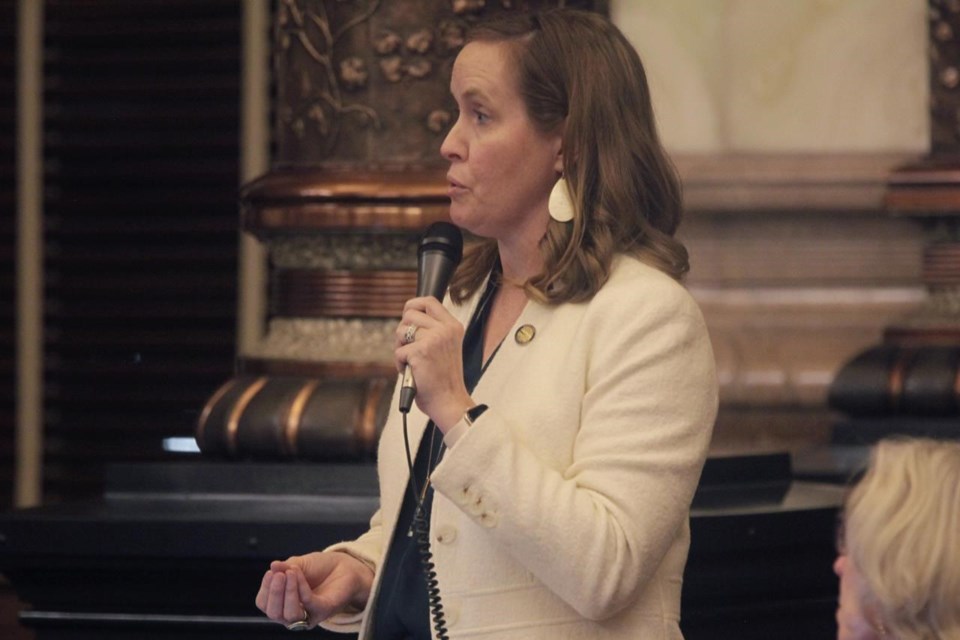TOPEKA, Kan. (AP) — Seven months after a decisive statewide vote affirmed abortion rights in Kansas, the Republican-controlled Legislature’s annual session in some ways looks a lot like previous ones, with multiple anti-abortion proposals.
But key players are focusing on incremental changes, instead of a ban. Their biggest goal this year is getting more financial help for centers that discourage abortions while offering free pregnancy and post-pregnancy services. An income tax credit for donors is one of three proposals that have gained traction in the state's Republican-controlled Legislature. The other two deal with medical malpractice insurance and telemedicine abortions.
Though abortion opponents have pulled some punches — quickly nixing an idea to try to pursue a 15-week ban — abortion-rights supporters argue even the limited changes being sought defy the will of voters.
“These extreme legislators think they know better than us what our families need to stay safe and healthy,” Ashley All, the main spokeperson for the campaign against the August ballot measure that would have allowed lawmakers to greatly restrict or ban the procedure, said in an email.
But abortion opponents contend that vote didn't preclude any new restrictions.
“You don’t have a full understanding of what that vote said about Kansas because of the complexities behind it," Senate President Ty Masterson, a Wichita-area Republican, told reporters. “So I just disagree that that’s the case, that it cuts against the grain of Kansas."
Kansas voters were the first in the U.S. to weigh in on the abortion issue after U.S. Supreme Court struck down Roe v. Wade in June. They resoundingly defeated a proposal to add an amendment to the Kansas Constitution stating that it does not grant the right to abortion.
That vote reset the national debate because the state leans Republican and has elected strong anti-abortion legislative majorities since the 1991 “Summer of Mercy” protests outside a Wichita clinic that was among a few in the nation known to perform third-trimester abortions.
The ballot measure was abortion foes' attempt to overturn a 2019 decision of the Kansas Supreme Court declaring access to abortion a matter of bodily autonomy and therefore a “fundamental” right under the state's Bill of Rights.
Senate Democratic Leader Dinah Sykes, from the Kansas City-area, where the vote was especially lopsided in favor of abortion rights, said anti-abortion lawmakers are showing that they still intend to try to ban all abortions.
“And they will do it one piece at a time,” she said.
The proposed anti-abortion amendment specifically asked voters to give “the people, through their elected state representatives and state senators” the power to “pass laws regarding abortion.” All, who campaigned against it, said the answer was a "19 points clear” no, referring to the final margin.
Many state restrictions remain despite the vote. Patients must wait 24 hours before getting an abortion, and minors must have the written consent of a parent or guardian. Most abortions are banned at 22 weeks.
But other restrictions are on hold, with two separate lawsuits before the Kansas Supreme Court over banning the most common second-trimester abortion procedure and imposing special health and safety rules specifically for abortion providers. A state law requiring the doctor to be in the same room with a patient taking their first dose of abortion medication also is on hold in the state courts.
One bill approved by the Senate last week would require the doctor to be physically present to write a prescription for pregnancy-ending pills — banning online or teleconference prescribing. Another would prevent abortion providers who can't get their legally required malpractice insurance in the private market from turning to a state fund providing it.
The proposed income tax credit is an attempt to strengthen the state's 50-plus network of centers that discourage women from having abortions through counseling or by providing free services, including pregnancy tests, sonograms and even housing. Arizona, Mississippi and Missouri have such credits, and Kansas' would be worth $10 million a year to donors.
Supporters say the centers address the financial needs of vulnerable women, girls and families. But opponents say they coerce women and provide inaccurate information — a contention the centers deny.
Jeanne Gawdun, a lobbyist for Kansans for Life, the state’s most politically influential anti-abortion group, said opponents of the August ballot measure assured voters that rejecting still would leave limits on abortion “because they knew for decades, Kansans have supported reasonable regulations."
"There are things that can be passed, but when those are brought up, all of a sudden, oh, well, ‘The vote, the vote, the vote,’” Gawdun said.
___
Follow John Hanna on Twitter: https://twitter.com/apjdhanna
John Hanna, The Associated Press



